It's all about the classical music composers and their works from the last 400 years and much more about music. Hier erfahren Sie alles über die klassischen Komponisten und ihre Meisterwerke der letzten vierhundert Jahre und vieles mehr über Klassische Musik.
Saturday, September 23, 2023
Please Be Careful With My Heart by Filipino-American Symphony Orchestra ...
♥ "I Believe" - by The Lettermen
Friday, September 22, 2023
The Great Composers’ Final Works
by Emily E. Hogstad
A jaw-dropping collection of technically dazzling fugues, stopped mid-measure, annotated by a poignant note from a grieving son.
Two delicate mazurkas that the composer was too sick to play and never heard performed.
A cantata for the freemasons.
A standard string quartet movement requested by a publisher to replace a masterpiece finale.
A song about a carrier pigeon.
These are descriptions of the final works of the most famous composers in classical music history. Composers rarely choose which piece will be the last one in their output. As a result, the stories behind all of them are varied – and very fascinating.
Bach’s Final Work: Art of Fugue
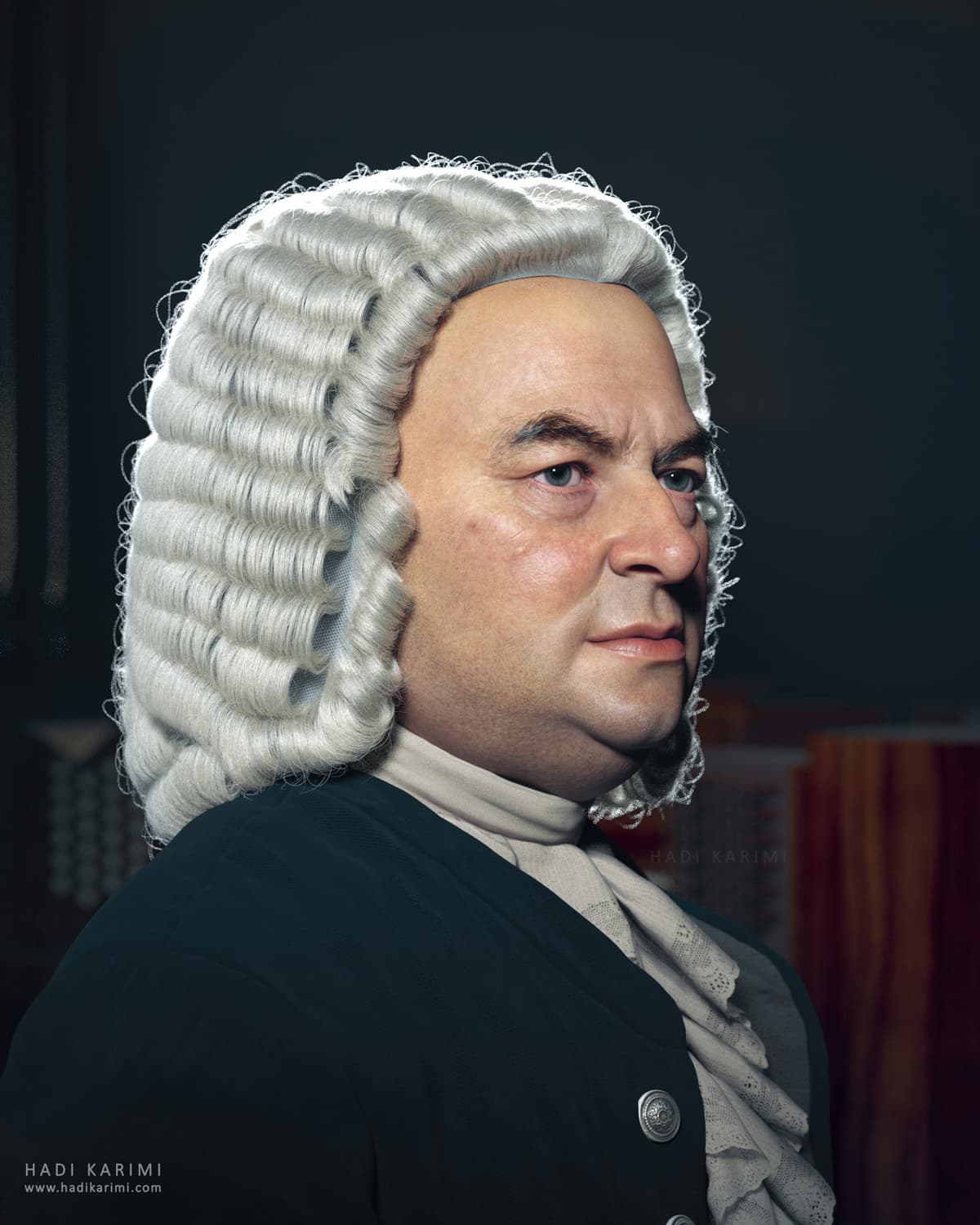
3D portrait of J.S. Bach by Hadi Karimi
The most famous final work in classical music history is probably Bach’s Art of Fugue, a set of pieces written for an unknown instrument.
But was it really Bach’s last work? The apparently final fugue in Art of Fugue is known as the “Fuga a 3 Soggetti” (or, in English, the “Fugue in Three Subjects”). Its manuscript famously ends in the middle of measure 239, as if Bach went off to dinner and never came back.
At the end of the aborted fugue, there’s a note in the handwriting of Bach’s son, composer Carl Philipp Emanuel Bach, that reads: “While working on this fugue, which introduces the name BACH in the countersubject, the composer died.”
However, scholars have pointed out that Bach endured a period of failing health before his death, including severe vision trouble that would have precluded his writing out this fugue. It seems more likely that the fugue dates back slightly earlier, to a year or two before his death.
Regardless of whether this was in fact Bach’s final work or not, it has entered classical music lore as such. And who are we to get in the way of a good story?
Mozart’s Final Work: Little Masonic Cantata
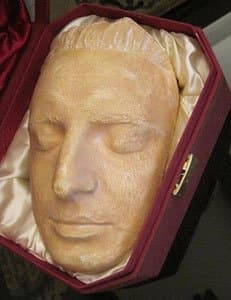
Mozart’s death mask
Thanks to the movie Amadeus, pop culture would have us believe that Mozart’s final piece was his Requiem. Mozart was indeed working on the Requiem upon his death in early December 1791, but his final completed work was actually a piece called the Little Masonic Cantata, written to celebrate the opening of the temple of the New Crowned Hope Lodge in Vienna. It premiered on 17 November 1791. Conducting that premiere would mark Mozart’s last public appearance as a musician.

Mozart monument in Vienna
This cantata creates a somewhat unusual sound palette, in that it was written for male choir and three tenor soloists, so it sounds very different from other works that Mozart wrote.
Beethoven’s Final Work: String Quartet No. 16
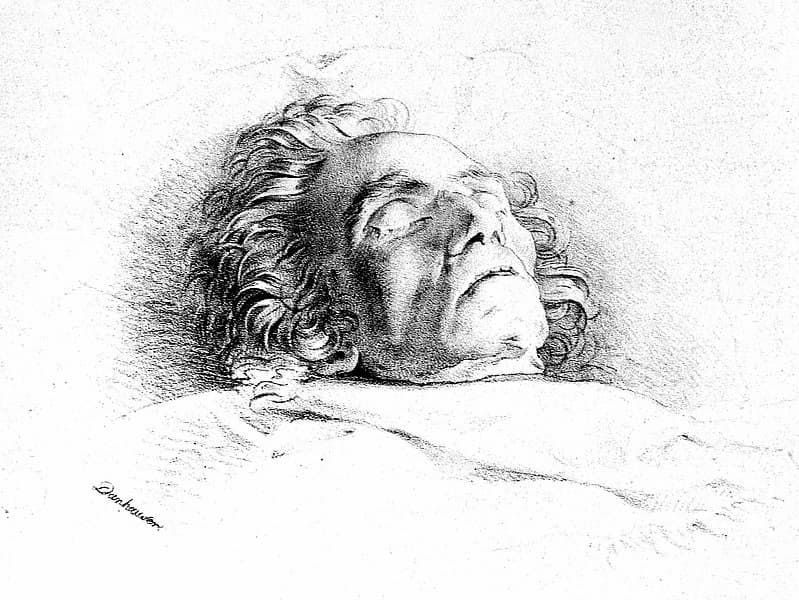
Beethoven on his deathbed
“What was the last music Beethoven composed?” you ask. There are two potential answers to that question.
The final work that he actually finished was his sixteenth string quartet, which was eventually published as his op. 135. It was completed in October 1826, five months before Beethoven died.
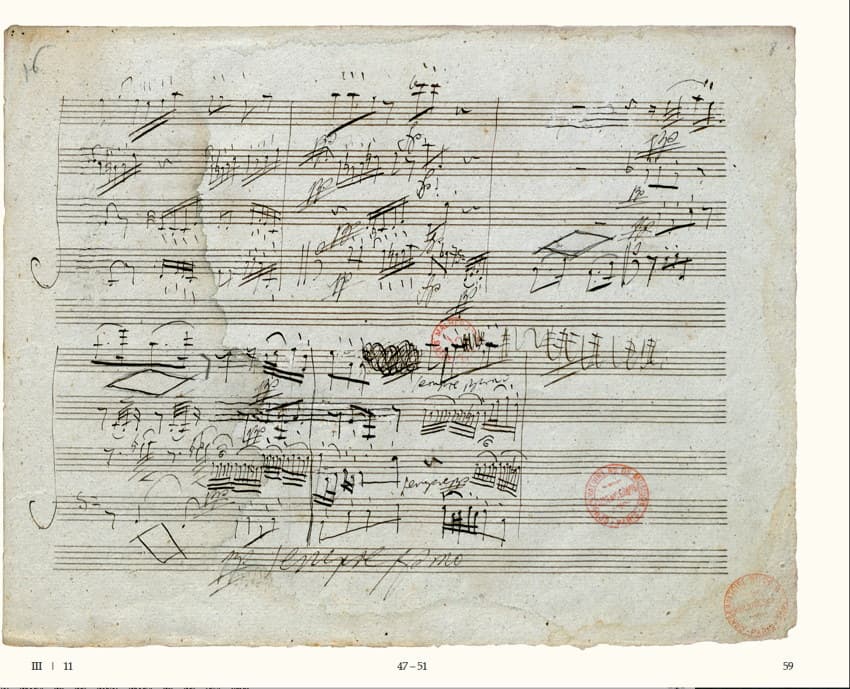
Beethoven’s Op. 130 “Große Fuge”
However, the final music that he wrote was the final movement of his thirteenth string quartet Op. 130, which he composed in November 1826. Beethoven’s publisher was not a fan of the original finale to the thirteenth quartet, claiming that it was too long, too demanding, and generally indecipherable. In response, Beethoven reluctantly tossed off a replacement finale. This replacement finale was added to the quartet, and the indecipherable monster movement was published separately as the Grosse Fuge.
(Another work that could conceivably be added to this list is Beethoven’s tenth symphony, which was completed in 2021 by artificial intelligence, based on Beethoven’ surviving notes.)
Schubert’s Final Work: “Die Taubenpost”

Grave of Franz Schubert at at Central Cemetery Wiener Zentralfriedhof
We don’t know for sure what Schubert’s final piece of music was, but the most frequently cited candidate is the song “Die Taubenpost” (“The Pigeon Post”). The text by poet Johann Gabriel Seidl describes the speaker’s carrier pigeon, who has been entrusted with an important message for a lover. At the end of the poem, the pigeon’s name and symbolic identity are revealed:
Her name is – Longing! Do you know her?
The messenger of constancy.
“Die Taubenpost” was published after Schubert’s death in a fourteen-song collection assembled by publisher Tobias Haslinger. Haslinger dubbed the collection “Schwanengesang” (Swan Song). It’s unlikely that Schubert actually intended for these songs to be published together, but of course the “swan song” theme of the collection suggested itself after Schubert’s untimely death.
Chopin’s Final Works: “Mazurka in G Minor, Op. 67, No. 2” and “Mazurka in F minor, Op. 68, No. 4”
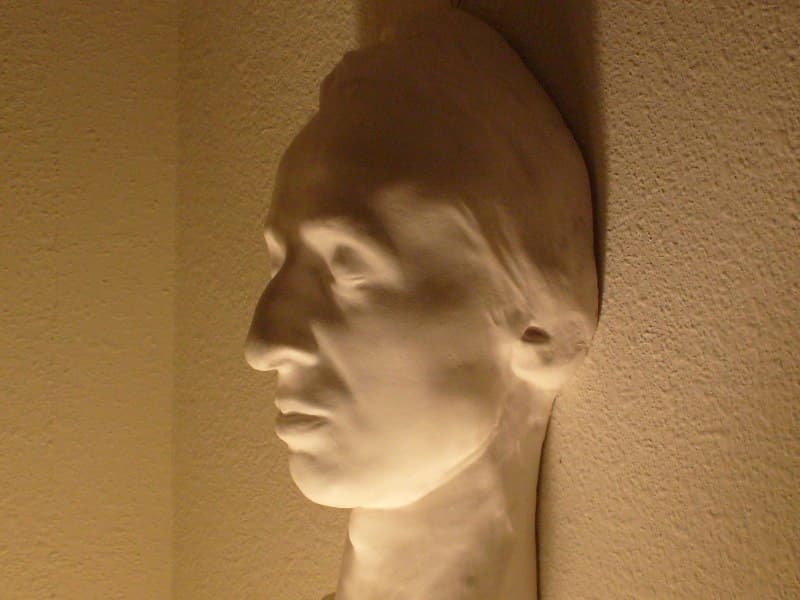
Chopin’s death mask © Wikipedia
When Chopin was on his deathbed in 1849, he asked that all of his music not yet assigned opus numbers be burned. Luckily for music lovers, after Chopin died in October, his mother and his sisters decided to veto his request. A Chopin friend named Julian Fontana selected a variety of manuscripts from Chopin’s papers and published them in 1855.
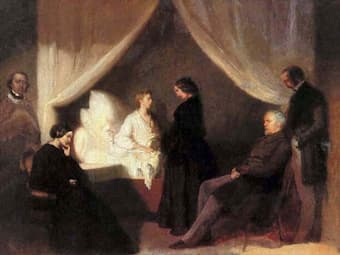
Chopin on his deathbed
Among them are what are believed to be Chopin’s last two compositions: the “Mazurka in G Minor, Op. 67, No. 2” and the “Mazurka in F minor, Op. 68, No. 4.” According to legend, Chopin never actually heard these last works, as he was too weak to leave his bed to play. They are both dreamy, haunting, devastating works: a quiet sendoff from an ever-elegant composer.
Thursday, September 21, 2023
Soloist barred from flight – after Ryanair claimed 18th-century violin ‘too big’ for the plane
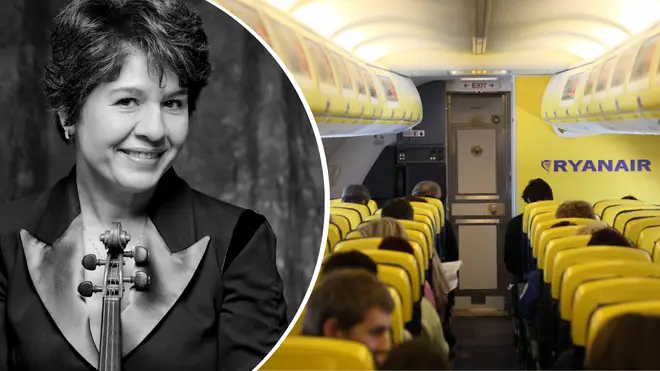
By Maddy Shaw Roberts
Romanian-born violinist Mihaela Martin claims airline staff said her violin, a Guadagnini dating from 1748, was “too big to take onboard.”
A leading violinist claims she was denied boarding by Ryanair after being told her violin was too large to take on board.
Mihaela Martin, a Romanian-born soloist who plays in a string quartet with Michael Barenboim, was travelling from the capital, Bucharest, when she was prevented from boarding her flight.
Martin said she had booked her musical instrument, a 1748 Guadagnini violin, as cabin baggage, but was told by staff that she “should have checked it in” as it was too large to take onboard.
“I explained that violins are never checked in and offered to buy [one] more ticket,” she added.
Martin claims the air host told her that “violins are never taken onboard” and that he would “be sacked if he doesn’t go by the book.”
Ryanair’s musical instrument policy states that violins, cellos and guitars that “exceed cabin baggage requirements” can be carried in the cabin “if a seat for it has been reserved and the appropriate fare paid.”
It is unclear whether Martin’s instrument exceeded the requirements. Classic FM has contacted Ryanair for comment.
Read more: Ryanair passenger films baggage handler ‘slamming’ his musical instruments onto airport luggage belt

Kodály: Duo for Violin & Cello, Op. 7: III | Mihaela Martin & Frans Helmersson
After being denied boarding, Martin stayed for one more night in the Romanian capital.
“So one more night in Bucharest where luckily they kept my room at the hotel,” she added in her Facebook post. “Now I have to search [the] internet for a flight tomorrow.
“Never ever again,” she concluded.
Martin performs prolifically across Europe, giving performances with the Bucharest Philharmonic and Staatsorchester Hamburg and featuring at the Verbier Festival and Budapest Academy Festival this season.
A member of the leading Michelangelo String Quartet, Martin has also collaborated in the past with her string quartet colleague’s legendary father Daniel Barenboim.
Alongside her concert commitments, Martin is a professor at the University of Music in Cologne, at the Barenboim-Said Academy in Berlin, and at the Kronberg Academy in Germany.
She also gives masterclasses around the world and is on the judging panel for competitions including Belgium’s Queen Elisabeth International Music Competition, Romania’s George Enescu International Competition, and the International Tchaikovsky Competition.
10 best musicals by Andrew Lloyd Webber – ranked
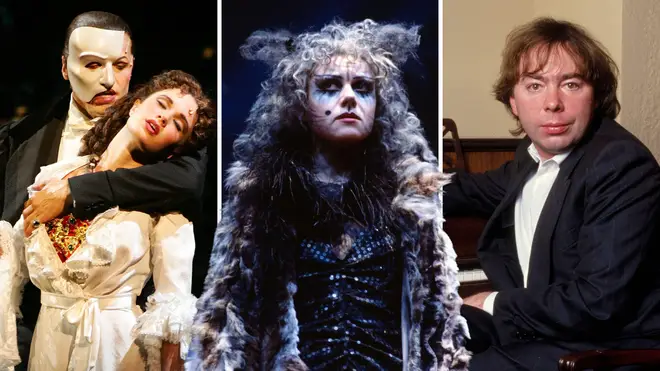
By Maddy Shaw Roberts
Andrew Lloyd Webber is one of musical theatre’s most prolific voices. His famous stage works range from biblical to animal – we rank his 10 best.
Since Joseph and the Amazing Technicolour Dreamcoat in the 1960s, Andrew Lloyd Webber has made a name for himself as King of the killer show tune, penning some of musical theatre’s catchiest melodies and most rousing choruses.
The subject matter he chooses is startlingly unpredictable. Who would have thought that an obscure Victorian gothic novel – Phantom of the Opera – or a collection of whimsical T.S. Eliot poems about feline psychology – Cats – would be the basis for two of the last half-century’s biggest musical hits?
The last 25 years have seen Lloyd Webber made a life peer, making him a Baron. He is the winner of 45 awards including seven Oliviers, seven Tonys and four Grammys, and owns a number of successful West End theatres through his theatre company.
And so, with more than 60 years of music to choose from, here are 10 of Lloyd Webber’s all-time greatest shows!
Love Never Dies
Love Never Dies, the fan favourite sequel to Lloyd Webber’s megahit Phantom of the Opera, was first previewed on the West End in 2010, but closed soon after and never made it to Broadway.
The musical was deemed to lack a bit of meat on the bone. But what it lacks in plot, it makes up for in music. The show has a sweeping score and soaring ballads which, when performed by the likes of Sierra Boggess and Ramin Karimloo, transport it to tenth place on the all-time best list.

'Love Never Dies' Anna O'Byrne | Love Never Dies
Aspects of Love
A revival of this 1989 musical reopened in London this year starring Michael Ball and Danielle De Niese but will soon be closing in West End, three months ahead of schedule.
Its slightly sinister plot includes multiple love affairs with a large age gap. But it has a great energy and a lovely piano-led score, with a strong hit song ‘Love Changes Everything’ – if you can turn a head to the subject matter…

'Love Changes Everything' Michael Ball | Aspects Of Love
School of Rock
Lloyd Webber’s rock musical had a strong foundation from the off, being based on the 2003 movie hit starring Jack Black as Dewey Finn, a rock guitarist-cum-substitute teacher.
It’s a classic lovable underdog story, featuring the almighty banger ‘Teacher’s Pet’, as well as an original new rebel anthem, ‘Stick it to the Man’. With a time-tested combination of driving rock rhythms, and soaring musical melodies, this is signature Lloyd Webber and remains a firm audience favourite.

Alex Brightman & the Cast Sing 'Stick it to the Man' From Broadway-Bound SCHOOL OF ROCK
Cinderella
Cinderella was Lloyd Webber’s 13th new musical, and it earned the composer some of the best reviews of his career. Its leading lady, powerhouse musical theatre star Carrie Hope Fletcher, delivers the heart-wrenching ballad ‘I Know I Have a Heart’ with aplomb, and the book, by Oscar-winning Emerald Fennel (The Crown) is funny and charming.
It was a musical hit by bad timing – not aided perhaps by its renaming to Bad Cinderella for a Broadway crowd – and Covid closures, over which the composer threatened to go to jail to save his show. But after that incredible run on Broadway, we reckon Lloyd Webber went out on a musical high.

Andrew Lloyd Webber & Carrie Hope Fletcher - Bad Cinderella (Official Music Video)
Cats
Neatly fitting into the Venn diagram of completely mad and total genius, Cats marked the end of Lloyd Webber’s run of successful shows with lyricist Tim Rice, instead being based on lyrics from T.S. Eliot’s ‘Old Possum’s Book of Practical Cats’. It’s filled with memorable moments including the glorious power ballad ‘Memory’.
Cats has made headlines in the last few years following a Hollywood film adaptation by which Lloyd Webber said he was so “emotionally damaged”, that he had to buy a therapy dog. “The one good thing to come out of it is my little Havanese puppy,” the composer dryly told a journalist.

'Memory' Elaine Paige | Cats The Musical
Sunset Boulevard
Sunset Boulevard is a deliciously intense adaptation of Billy Wilder’s 1950 film. Coming back to the West End this year starring Nicole Scherzinger as the immortal Norma Desmond, its hit songs ‘As If We Never Said Goodbye’ and ‘With One Look’ put it up there with Lloyd Webber’s best. And no one does it like Glenn Close...

The Fabulous Glenn Close Sings 'With One Look' | Sunset Boulevard | The Shows Must Go On!
Joseph and the Technicolour Dreamcoat
Now we move into the reliable realm of the longlasting Lloyd Webber-Tim Rice partnership. After meeting as teenagers, the duo would work prolifically together in a fruitful musical collaboration which produced three hit shows: Evita, Jesus Christ Superstar, and Joseph.
Based on the Bible’s book of Genesis and originating from a cantata written for school choir, it’s one in a line of Lloyd Webber musicals with unpredictable origins that work startlingly well in musical form. Joseph is jam-packed with catchy tunes including the wide-eyed ballad ‘Any Dream Will Do’, and is a favourite at school productions today.

Andrew Lloyd Webber, Jason Donovan - Any Dream Will Do
Evita
Did you know this Tony-winning show started as a rock opera concept album? The unlikely 70s hit show, containing the heartaching ‘Don’t Cry For Me Argentina’ – which repeats rather a lot in various iterations throughout the musical, not that we’re complaining – has yet another unlikely subject matter, being based on the wife of an Argentinian president.

'Don't Cry For Me Argentina' Elaine Paige | EVITA
Jesus Christ Superstar
It’s hard to imagine this being written today, but boy does it have an impact. This adrenaline-pumping rock opera is well within the Lloyd Webber-Tim Rice partnership, and before it was taken over by Cats in the 80s and 90s, it was the West End’s longest running musical.
The music is thrilling, especially the moment Lloyd Webber forgot his ‘Jesus’ actor was human and gave him a stratospheric G5 to sing at the climax of ‘Gethsemane’.

Gethsemane (Steve Balsamo) - 'Musicals in Ahoy' Concert 2004 | Jesus Christ Superstar
The Phantom of the Opera
The most successful British musical in history, The Phantom of the Opera is an 80s extravaganza of decadent visuals and ageless music. It’s by far Lloyd Webber’s strongest score, from the delicate soprano plea ‘Think Of Me’ to the bare-chested, full throttle ‘The Point of No Return’. Devastatingly romantic, it’s been an incredible showcase over the years for some of the most dizzying soprano voices – from Lesley Garrett to Sierra Boggess.
Wednesday, September 20, 2023
Top 5 Boogie Woogie Women
Toma Cayabyab: The son rises
In music, each note tells a tale and melodies carry feelings.
Also, there exists a legacy that reverberates through generations.
National Artist Ryan Cayabyab, a master whose compositions are woven into the heart of Filipino culture, has nurtured a family of musicians.
Toma, his son, rises with distinction, carving his own musical journey.
Toma embodies the essence of a true artist as he upholds his father's legacy.
In an interview, he shared his musical journey and talked about the crucial role of conductors in musicals.
According to him, being a conductor involves more than meets the eye.

"Ang conductor hindi lang siya yung nakikita lang ng audience na we're just waving our hands in the air," he said.
He explained that, before the final performance, conductors ensure a unified and synchronized show.
"Ang hindi nakikita ng audience is kami yung nag-e-ensayo. Yung mga sections, kunwari violins, nag-e-ensayo sila on their own; individually or in groups, pero yung conductor, we bring everyone together," he explained.
Toma emphasized that conductors guide and teach the ensemble. They begin by studying the piece, interpreting the composer's intentions, and then bringing their own artistic interpretation to the performance, considering elements like tempo, dynamics, and phrasing.
They set and maintain the tempo of the music, guiding musicians through changes in speed. They communicate their interpretation to the musicians through cues, indicating when each instrument or section should start playing. They also direct musicians on when to change dynamics, articulation, and other musical elements.
During rehearsals, conductors lead by ensuring everyone understands their parts.
Toma led The Orchestra of the Filipino Youth in the highly-acclaimed Filipino rock opera ballet, "Rama, Hari" at the Metropolitan Theater over the weekend. Of course, he expressed gratitude for the supportive and responsive audience.

The ballet is based on the ancient Sanskrit epic "Ramayana" which follows Prince Rama from his marriage to Sita, their 14-year banishment, and their encounters with the evil Ravana and his sister Soorpanakha.
The production stands out as an exclusive collaboration showcasing the exceptional talents of five National Artists. These luminaries include Alice Reyes for Direction and Choreography, Salvador Bernal for Production Design, Bienvenido Lumbera for the lyrics and libretto (with English Translations by Rolando Tinio), and Ryan for Music.
On the topic of Ryan, Toma was asked about the advice he received from his father regarding work.
He mentioned: Putting in the hard work and finding enjoyment in what you do.
Toma added that this approach has proven to be quite beneficial.
"Kasi some people would say na parang mas stress sila sa work or parang na dishearten, ako, I really totally understand that. Ang ginagawa ko talaga is to keep working and enjoying what I do. If it's a successful kind of production or okay lang, at least ang pinaka habol ko would be the experience," he related.
"Alam mo yung sinasabi nilang 'You only live once.' So for me gawa lang ng gawa. Perform lang ng perform. Enjoy lang ng enjoy ng buhay at magpasalamat sa Diyos na meron tayong opportunity to perform the art, to make music, perform music, ma-touch ang mga lives ng mga tao. Yan ang buhay. Live life."
When asked about the challenge of carrying on the legacy of a showbiz royalty, Toma acknowledged it's not easy. However, he emphasized that his journey isn't about copying his father's notes. Instead, he's creating his own melodies.

"At first, totoo, laging may expectations. Laging nandu'n yung shadow. Actually ang maganda kay Papa kasi hindi niya ako pine-pressure e. Ang pressure comes from other people around us," he shared.
"Kasi yun yung expectations ng mga tao kasi anak. 'Dahil anak ka, ito yung expectations namin sayo.' Si Daddy wala siyang ganu'n. Ang pagpapalaki niya sa amin 'Do what you want to do. Enjoy what you want to do.'"
Due to the familiarity of that impression, he opted to strike out on his own, which led him to initially experiment with film. Later, he returned to music and established his own jazz choir.
"Para lang makagawa ako ng name for myself and for my band," Toma said. "Gumawa rin ako ng sarili kong areglo. Sarili kong composition through my band. So yung mga ganu'n. Itong conducting also... I think it's a good avenue for me to really prove myself and to people that I can be who I can be."
Toma completed his Bachelor of Arts degree in Communication at Ateneo de Manila University in 2013.
After two years, he pursued a Bachelor of Music in Conducting at the University of the Philippines, where he graduated Magna Cum Laude.
Since then, he has had the opportunity to conduct guest performances with renowned ensembles such as the Philippine Philharmonic Orchestra, ABS-CBN Philharmonic Orchestra, and Manila Symphony Orchestra.
Currently, he is pursuing his master's degree.
"For me, this is something that I enjoy and I want to do," he stressed.
In addition to his role as a conductor, Toma also heads a jazz band called Debonair District, where he is actively involved in composition.
"So in that aspect, du'n ko rin na-hone yung skill ko in performing, making music, singing. Kaya parang hand in hand siya, yung pagko-conduct at pag-areglo, at pag-perform."

